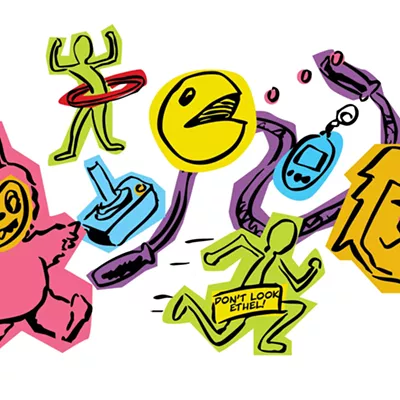I spent last week cosplaying as a DJ at the Kootenai County Fair — a haze of golden dust and nostalgia where families gathered daily to eat, drink and be merry. As a sober-ish, depressive-disordered dude fearfully courting his Henry Rollins era, I felt a bit out of place at times. It called to mind my childhood in the Midwest: watching reruns of sitcoms in the summer, attempting to understand Carl Jung while getting sunburned, and listening to Garth Brooks. Lots of Garth Brooks.
On my way home, in the safe space of my 2000 Dodge Ram Van, I would listen to a copy of Counting Crows' 2002 album Hard Candy that I'd picked up from Pirate Traders in the Valley a few weeks earlier. My relationship with the band has largely been determined by whatever used CDs worked their way into my collection over the years. Copies of August and Everything After and Recovering the Satellites have been criminally available in thrift stores for the better part of two decades, so I've always had a copy of those on hand.
I was already familiar with the album's singles, but they never really clicked with me. When I thought of Hard Candy, I always thought of the track "Good Time" — a track that frequently found its way onto whatever MP3 player I had on hand in my late teens. The track is a bit of a standout in the band's discography. With a heavy Pink Floyd influence, the track is driven by bass and keys, with psychedelic eruptions of electric guitars. It would make more sense on an album with guest vocals by Portishead's Beth Gibbons rather than the actual guest-spot from Sheryl Crow on "American Girls."
But, as it often is with Counting Crows, my real interest is in the story songwriter Adam Duritz is telling in "Good Time." A romantic poet at heart — with the hope of Whitman and the melancholy of Poe — Duritz's work often has characters that mirror his speaker. We learn a lot about Duritz and his sense of isolation through his relation to his doubles.
For instance, the titular character of their first smash hit "Mr. Jones" is an idealized double — a cool-speaking guy who can talk to any girl in the bar. Even the black-haired flamenco dancer. Duritz's speaker wants to be like that — he wants to believe in himself, he wants to be loved, he doesn't want to feel alone in a crowded room.
But, in "Good Time" the foil is an oddly dressed "gentleman caller." Unlike the charismatic Mr. Jones, he "stutters over what to say." Also, unlike Mr. Jones, Duritz's speaker empathizes with, rather than idolizes, this unnamed character. Even though, by the time of writing the song, Duritz had achieved the stardom he wished for in "Mr. Jones," simple conversations are "no easier for [him] some days."
In 2008, Duritz disclosed a long-standing battle with a dissociative disorder in an essay with Men's Health magazine. A defense mechanism at heart, dissociation is a learned response to trauma — the mind distances itself from reality in order to protect itself. Sometimes this occurs as a shift in identity, as with the often misunderstood disassociative personality disorder, or as memory loss.
Duritz deals with derealization: When the world becomes too much, the mind cushions itself in clouds of disbelief, softening the harsh blows of the world by making them appear unreal. Although diagnosed sometime between the release of Hard Candy and the 2008 follow-up Saturday Nights and Sunday Mornings, the Sisyphean wrestling match with one's own mind has been at the heart of Duritz's lyricism throughout his career.
Creating art as a means of understanding the peculiarities of one's own mind is nothing new, especially for artists whose creative gifts are so often paired with mental illnesses. As we've seen with countless masters — Poe, Goya, Cobain — a nascent, monstrous mental illness will bubble up from the murky waters of the unconscious and confront the artist. The artist wrestles with the beast. Results may vary.
The internal battle is only half of the equation for the "rock star" — whatever that word means these days — who is also flanked by the ruthless reality of rigorous touring schedules. In the aforementioned Men's Health article, Duritz recounts momentarily choosing to hop on the flight to his next gig instead of booking it back to the states to attend his grandmother's funeral. The reality of the "show" seemed more real than the reality of a loved one's death.
How does one continue living like that for decades? Where does one go when — head and world alike filled with demons — there is no safe haven? It's no wonder so many, as Duritz himself admits, turn into self-involved assholes. If you run away long enough from the world, from yourself, there's little, if anything, left to salvage.
While Duritz places little faith in notions of redemption, Counting Crows's most recent release Butter Miracle: Suite One, shows that, given enough time and self-work, things do get better. Calling to mind the work of graphic designer Storm Thorgerson's surrealism, the cover features a woman with a piece of buttered toast for a head. She's colossal — bigger than mountains — and holds a knife in her hand. Buttery flowers bloom in the background.
On the surface, the collage by artist Beth Hoeckel might seem absurd, but it also demonstrates a new sense of self-awareness. Perhaps more common than the "double" archetype in Duritz's lyrics is what one might call "the Radiant Maiden." Another vestige of romanticism, the love interests in much of Duritz's work have felt impossibly idealized and totally anathema. Even when they have different names — Maria, Anna, Elisabeth — they all seem to represent the same fantasy. They're all more "idea" than "reality." The cover for Butter Miracle: Suite One inflates this idea ad absurdum.
This newfound self-awareness permeates Butter Miracle: Suite One. Drawing on the sort of semi-autobiographical storytelling Phil Lynott explored in Thin Lizzy's vaguely conceptual Johnny the Fox, Counting Crows' newest record features a cast of larger than life characters. Both Johnny the Fox and Butter Miracle: Suite One share another commonality: They are both bands', for want of a better word, "coolest" records, in the Mr. Jones sort of way.
Counting Crows returns to the Spokane area on Sept. 13, playing at Northern Quest Casino with 2000s emo band Dashboard Confessional. If you were lucky enough to catch Counting Crows a couple years back at the Spokane Pavilion, you got to see the band just returning to the stage after its longest break from touring. One would imagine Duritz and company are back in full swing.
The name Counting Crows comes from an old nursery rhyme that deals with fate. "One for sorrow / two for joy," the song goes, as it, rather melancholically, links one's emotional fate — whether you'll end up a Mr. Jones or a Gentleman Caller — to the number of black birds they can count. Of course, mental health, belonging and love aren't as simple as the nursery rhyme would suggest — but, just in case, you should catch Adam Duritz and his murder when they fly into town. You might even have a good time. ♦
Counting Crows, Dashboard Confessional • Wed, Sept. 13 at 7:30 pm • $20-$851 • All ages • Northern Quest Resort & Casino • 100 N. Hayford Rd., Airway Heights • northernquest.com
























